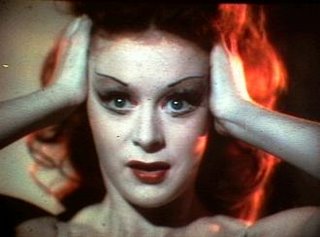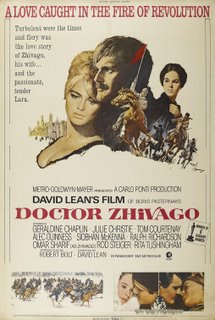Ballet and Bolsheviks.
 It's been a funny old day. Riddled with self-anxiety I thought the best place to turn was the intrinsically charming duo of Michael Powell & Emeric Pressburger; those formerly 'out-of-step' Brits who've since enjoyed lollops of praise from Coppola, Lucas and Scorsese amongst others. This fact is cited quite a bit seemingly to expunge both the 'quaintness' and, in the case of The Red Shoes (arguably their most celebrated picture), the overwhelming ballet factor. If that's drawing in the arthouse crowd, brilliant. But there's more to be had from this work of art than glib reference. Scorsese calls it one of the most beautiful films in colour, because it is. It's achingly beautiful. And in a state of emotional fragility, it's impossible not to be affected, not to be moved in some way, by the fairy tale of Victoria Page. The fact that The Red Shoes includes a seventeen-minute ballet number is largely immaterial. That's not to say it's a gratuity (it isn't) but it's impossible not to be completely swept away by the sheer hyperbolic poignancy. Ballet is totally beyond me, but The Red Shoes isn't.
It's been a funny old day. Riddled with self-anxiety I thought the best place to turn was the intrinsically charming duo of Michael Powell & Emeric Pressburger; those formerly 'out-of-step' Brits who've since enjoyed lollops of praise from Coppola, Lucas and Scorsese amongst others. This fact is cited quite a bit seemingly to expunge both the 'quaintness' and, in the case of The Red Shoes (arguably their most celebrated picture), the overwhelming ballet factor. If that's drawing in the arthouse crowd, brilliant. But there's more to be had from this work of art than glib reference. Scorsese calls it one of the most beautiful films in colour, because it is. It's achingly beautiful. And in a state of emotional fragility, it's impossible not to be affected, not to be moved in some way, by the fairy tale of Victoria Page. The fact that The Red Shoes includes a seventeen-minute ballet number is largely immaterial. That's not to say it's a gratuity (it isn't) but it's impossible not to be completely swept away by the sheer hyperbolic poignancy. Ballet is totally beyond me, but The Red Shoes isn't.I was really quite shattered after my P&P fix for the day -I'm currently working
 my way through their boxset- though it affirmed my love for Anton Wallbrook. And so, perhaps rather erroneously, in my continued rehabilitation, I turned to another British institute: David Lean. Three hours of the chap. My History teacher decried Doctor Zhivago as "so overrated". The tagline sells the film as 'A Love Caught in the Fire of Revolution!'. Well, that isn't faintly true. Omar Sharif and Julie Christie barely spend the first hour of the film together, but that's entirely the point. I think it works in Zhivago's favour. It simply isn't Brief Encounter, nor is it trying to be. So, sure, the film is vast and loaded with scatty emotion -and it really can't be considered a favourable History lesson- but it's very readily accessible. A story this grand, filled with as many grand performances (Rod Steiger is the obvious highlight) is accelerated by Lean's bullied artistic drive. Stodgy and epic? Of course. Feel good and gorgeous? Why the hell not? It does gloriously skim over the horrors of Russia's governmental troubles between 1917-1923, however, but it will make you feel that love can be pure and tragic once in a while. And not just the other type.
my way through their boxset- though it affirmed my love for Anton Wallbrook. And so, perhaps rather erroneously, in my continued rehabilitation, I turned to another British institute: David Lean. Three hours of the chap. My History teacher decried Doctor Zhivago as "so overrated". The tagline sells the film as 'A Love Caught in the Fire of Revolution!'. Well, that isn't faintly true. Omar Sharif and Julie Christie barely spend the first hour of the film together, but that's entirely the point. I think it works in Zhivago's favour. It simply isn't Brief Encounter, nor is it trying to be. So, sure, the film is vast and loaded with scatty emotion -and it really can't be considered a favourable History lesson- but it's very readily accessible. A story this grand, filled with as many grand performances (Rod Steiger is the obvious highlight) is accelerated by Lean's bullied artistic drive. Stodgy and epic? Of course. Feel good and gorgeous? Why the hell not? It does gloriously skim over the horrors of Russia's governmental troubles between 1917-1923, however, but it will make you feel that love can be pure and tragic once in a while. And not just the other type.
